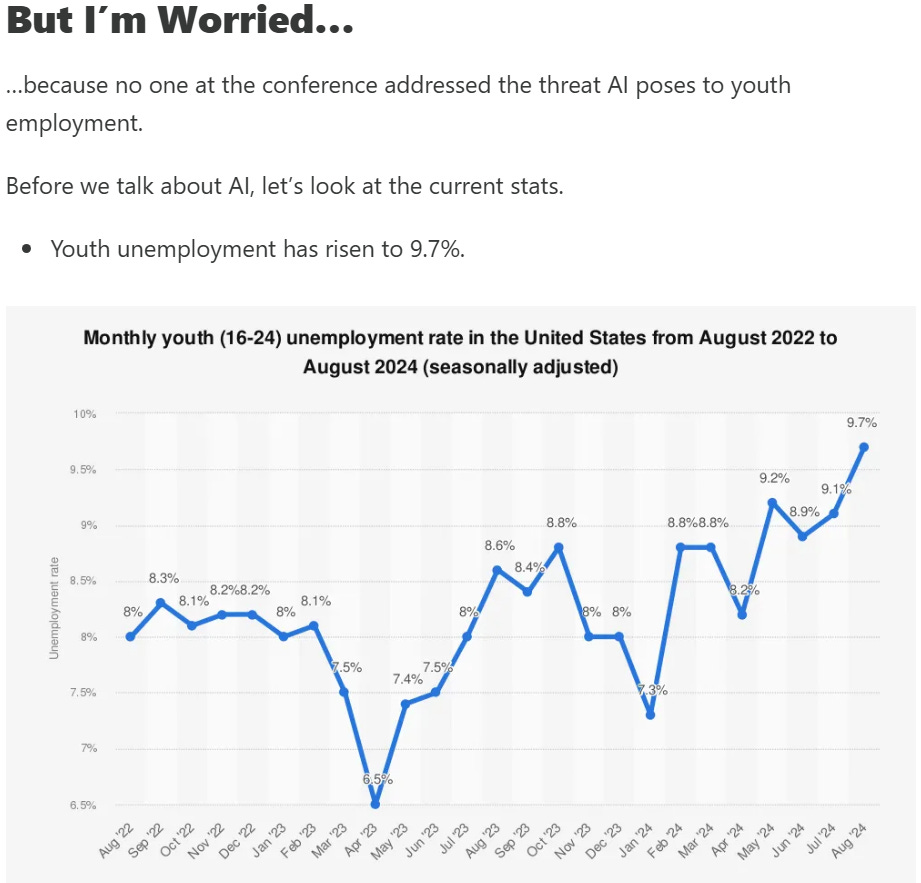The AI Job Apocalypse That Isn't Coming
Why the panic over artificial intelligence replacing workers misses the real opportunity
Note: I was going to publish a different article this week, but last week's news changed my plans. What's happening now simply can't wait, which is why I’m publishing this on Monday instead of Wednesday.
Last week, Dario Amodei dropped a bombshell. The CEO of Anthropic, maker of Claude AI, predicted that artificial intelligence could eliminate 50% of entry-level white-collar jobs in the next one to five years, potentially driving unemployment to 20%.
The media response was swift and apocalyptic. "White-collar bloodbath" screamed the headlines.
LinkedIn's Chief Economic Opportunity Officer, Aneesh Raman, piled on, warning that college graduate unemployment had already risen 30% since September 2022. His research suggested that professionals with advanced degrees are more likely to see their jobs disrupted than those without.
But the hysteria obscures a more fundamental question: Why are we fighting to preserve jobs that make people miserable?
The Entry-Level Experience Myth
Yes, landing entry-level positions and internships has become brutally competitive. Companies are using AI to handle tasks once reserved for junior employees. Research, data entry, basic analysis, and content creation now happen at the click of a button. The traditional ladder, where you start at the bottom and learn on the job, is losing its bottom rungs.
This leads to an obvious concern: How will college graduates gain experience if they can't get hired?
But here's a better question: Why do you need some company's permission to get experience?
In my 20 years in the corporate world, I learned that companies rarely teach you anything. I had more than a dozen bosses during those years. While many were lovely people, they relied on me to know what I was doing instead of teaching me anything. One boss told me straight out: "I have nothing to teach you."
Today, anyone with internet access can learn virtually any skill and build a portfolio demonstrating real capability. The notion that you need a corporate job to gain experience is becoming as outdated as the fax machine.
The Factory Floor Revelation
Another question. Why are we still talking about white-collar versus blue-collar anyway? This artificial divide treats office jobs as supposedly superior, and that’s part of the problem.
I'm obsessed with touring factories. I look for them whenever I travel. Since the U.S. has so few factories open to the public, most of my tours have been in Europe. Leather workshops, automotive plants, and umbrella manufacturers are just a few examples.
Nothing made me question the distinction between white-collar and blue-collar work more than the Maserati factory tour in Modena, Italy.
Before you dismiss this as a luxury brand story, let me explain. The facility itself was surprisingly basic. You could walk by without noticing it except for the sign. Inside, it had huge windows and tons of natural light. The floors were incredibly clean, cleaner than most restaurants where people eat food.
What really stood out was that I couldn't tell who was doing “white-collar” or “blue-collar” work. The engineers on the floor were technical experts who clearly took pride in what they did. More employees worked in offices developing technological breakthroughs than on the assembly line. Robots handled hazardous painting tasks in sealed chambers.
The old distinctions had become meaningless. Everyone was using technology and solving problems.
The Failed Experiment
For generations, we've believed office work represented progress.
Working in those skyscrapers was supposed to be the pinnacle of success. But this has all been one giant experiment, and honestly, it hasn't gone very well.
Just scroll through LinkedIn for five minutes, and you'll find a remarkably consistent set of complaints:
Workers are burned out.
Managers are terrible.
Corporations are evil.
Gallup's research consistently shows that over 70% of employees are disengaged. They come to work solely for the paycheck, ready to quit at the first opportunity.
We created a system where most people are miserable most of the time, and now we're panicking because AI might take away these soul-crushing jobs? If AI can handle the work that's making people unhappy, why are we fighting so hard to preserve it?
Real Problems Need Real Solutions
The doomsayers miss a crucial point. As long as problems exist in the world, there will be jobs for people to do. We're clearly not living in a utopia.
Look around. Regardless of your political affiliation or economic status, everyone agrees that the world faces enormous challenges. Spend two minutes on social media, and you'll compile a lengthy list of grievances.
Climate change, healthcare, education, infrastructure, inequality. Pick your crisis.
Progress requires innovation, and innovation requires human creativity, judgment, and initiative. The jobs aren't disappearing. They're transforming into something potentially much better than what we have now.
We're already seeing this play out. Resources saved through AI deployment are being redirected into other areas. While some jobs are being eliminated, new ones are being created.

It's the same pattern we've seen with every major technological shift. The printing press didn't eliminate the need for writers. It created an explosion in literacy and publishing. The internet didn't destroy commerce. It transformed how we buy and sell everything.
The tech industry is obsessed with AGI and ASI (artificial general intelligence and artificial super intelligence).
But I believe we're capable of much more than we've had a chance to demonstrate because we've been stuck in manual, meaningless jobs. Now we have a chance to elevate ourselves and tackle problems that seemed unsolvable before.
A Note on Risk
I'm not naive about AI's dangers. In the wrong hands, this technology can cause tremendous harm. Privacy violations, algorithmic bias, deep fakes, automated misinformation campaigns, and cyber warfare capabilities keep security experts up at night and for good reason. These risks are real and frightening.
However, since I write about jobs and the future of work, not politics or cybersecurity, I'll note that even these risks create opportunities for new jobs.
The Real Choice
Eight months ago, I wrote an article, I'm Worried, about rising unemployment among young professionals and the lack of attention it was getting.
Now we've swung to the opposite extreme, with dire predictions of mass joblessness that ignore both history and human adaptability.
The truth, as usual, lies somewhere in the middle. AI will eliminate some jobs, particularly repetitive, rule-based work that shouldn't require a college degree anyway. But it will also create opportunities we can't yet imagine, just as the internet spawned entire industries that didn't exist in 1990.
Instead of clinging to an employment model that leaves 70% of people miserable, we should embrace this chance to build something better. The real tragedy would be fighting to preserve jobs that make us unhappy when we could be solving problems that matter.
Curated Articles & Opportunities
Connor Grennan: The Entry-Level Crisis that's actually your Opportunity
Tim Denning: To Do Your Best Work, Use the 85% Rule
Alina Okun: How to Monetize Your Expertise as an Advisory Board Member
P.S. If you’re ready to discover income opportunities that match your expertise, learn more here.





This was a fascinating read Alina. The quality of our lives reflects the quality of our questions and I love your thought-provoking inquiries like: Why do you need some company's permission to get experience? I recently said to my daughter, "We live in such an interesting world because you don't have to go out and find a job; you can create your own."